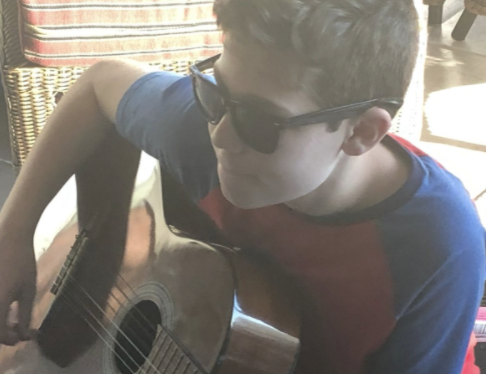Early on in the process of this interview’s creation, I knew I would produce my best work if I challenged myself. My goal was to get outside of my comfort zone and interview someone that I usually wouldn’t, and as I went through a list of candidates that more or less fit the bill, I landed on Mrs. Ceida Fernandez. I was mostly familiar with her through the Film Critics Club, which I myself am a part of, and had heard great things about her from peers. It was a mixture of her time here and her involvement with the Spanish departments that spoke to me the most, however.
I will admit that before meeting with Mrs. Fernandez I had my share of last-minute concerns with how interesting this interview might be, given that I hadn’t known her all that well. That said, I knew as soon as the first question was wrapped up – and her response was so thorough that it had answered at least four of the following 14 inquiries – that I had made the right choice. The interview was conducted outside in the morning sun via mutual agreement, on a picnic table overlooking the parking lot. As soon as we sat down I got my phone out and pressed record on my voice memos app and stumbled through my first question: “how do you feel you have impacted Baldwin during your time here, whether it be through students, colleagues, a specific program or anything else?” She answered clearly and carefully, and spoke about how she has experienced Baldwin changing over the years, especially from her point of view in the Spanish department. At a time, she coordinated the SSL, standard level Spanish, and French programs all at once, and found that many of the SSL students she had overlooked had ended up in her Puerto Rican literature class. “At that moment, language was not a limitation.” She told me.
The pride she had in her students was clear throughout the interview. She mentioned multiple times that they were her greatest accomplishments, and expressed the responsibility she felt she had to cultivate their interests. She also brought up the Film Critics Club as an accomplishment, and how it went hand-in-hand with her Cine y Literatura elective class, which was originally soley a film class that she then integrated literature into. This was based upon the idea that film is a medium of literature, and vice versa. She said about this, “The main support of film is literature, and in the development of that industry, literature is nourished by the techniques of film.” She continued to describe her elective fondly, sharing anecdotes of students whom she felt she had impacted. She hoped the elective would stay, even after she retired.
The topic of the students’ impact on her was explored thoroughly, as she shared about the importance of their contribution; it was her opinion that the student must be considered above all else when teaching. This was backed up with a beautiful anecdote about a former student she had taught with Dyslexia, and how she changed the way she taught her class to accommodate them. As a student who has struggled with ADHD in the past, this was touching to hear, but it was also a reminder to me of the interests of the Baldwin program which she had for so long been a part of. It was interesting to hear about which specific movies impacted her students, and how. She made the observation that students were drawn to movies like Pan’s Labyrinth, as they were more immersed in the world of the movie seeing a young protaganist that they could attach themselves to. I agreed with this observation wholeheartedly, as that filmmaking technique had always intrigued me. At many points she came back to the Hungarian director Lajos Koltai, and his film Fateless, which was about a 14 year old boy caught in the midst of the Holocaust. It was clear at this point that Mrs. Fernandez holds her students close to heart, and her experiences in teaching have shaped who she is today. The interview was starting to unfold into a story, and so I kept inquiring.
“Are there any regrets or missed opportunities that have stuck with you through the years?” I asked her, and to be honest, I was fully prepared for a simple “no” based on how positively she had spoken of her experiences thus far. There was a pause, and I almost instinctively started to fill in the space before her reply: a pained “yes.” “A teacher always has the feeling that there is something more to teach, something more (the students) can learn, something more they can read.” It was incredibly interesting to learn about some of the struggles that teachers must be faced with, whether it be a two week gap in the curriculum for the seniors’ mock exams or any other unforeseen obstacles that a teacher cannot predict. I inquired about what had led her down her career path in her early years, and was of course treated to another beautifully thorough response. I hadn’t known about her upbringing, and learning that she had grown up in a communist Cuban environment was remarkably intriguing. “Spending my first 11 years in Cuba made me a reader.” She informed me. “It was the only way I could survive those days.” She had discovered her grandfather’s library, and she credits this as a major catalyst of her love for literature. “I understood that reading and teaching and talking about and sharing what I was reading was what I wanted to do with my life.” She spoke passionately, and it was clear that I had struck a chord with her. “I think that there is a tremendous, beautiful, terrible world in books, and I want them.” Her words were so stark, yet so poignant in this moment.
As the interview started to come to a close, and I asked my final questions, she talked to me about her open-minded view on technology, stating that it was something that she was always learning about from her students. She spoke on the communication in the departments as well, how the teaching between the arts departments needs to have a more interdisciplinary approach. This brought with it the idea that all forms of art are connected. I thought back to the beginning of the interview, when she mentioned the relationship between literature and film, and to something specific she had said. “Students always ask me, ‘what is the purpose of this book?’ and I have a line for them: you cannot live without literature.” Right then, there was no assignment for me to complete, no teacher, no student and no iPhone recording our interview. For that moment, we were equals, learning from each other and growing; I was in her class, and she was in mine.




